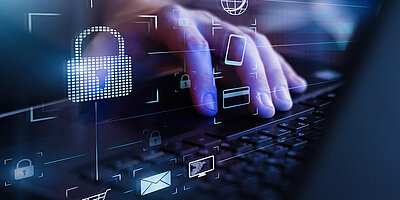In a digitalised world, consumers are in demand not only as active buyers but also as passive suppliers of data. This data has become the raw material and currency of the "digital economy".

We live in a world where we are promised more security if we are willing to endure surveillance. But what happens to our privacy? And does more surveillance really result in a more secure environment? Technology assessment examines the consequences of this development. One thing is certain: we, as individuals, pay a high price by chasing the idea of absolute security.
The ITA investigates the relationship between security, surveillance and privacy. It focuses on the short- and long-term effects that happen when we lose our privacy – we become vulnerable and easier to manipulate. The main research focus is on the relationship between technologies, fundamental rights and the social and political consequences. The aim is to provide options for action that enable political decision-makers as well as citizens and stakeholders to deal responsibly and consciously with surveillance technologies, but also with our privacy.
The terrorist attacks in New York, London and Madrid at the beginning of this millennium have significantly changed our perception of what security is and how much it means to us. The fear of terrorism accelerated a progressive development towards a security society and the "securitisation" of many areas of life. As a result, tendencies towards more surveillance experienced a dramatic raise. The security industry has become a major player in our society. It promises us technical solutions for a multitude of social problems.
These include extremely complex issues such as distributive justice, migration, terrorism and data protection. The goal is to present us with "simple" answers. Suddenly we no longer live in an unjust world, but in a dangerous one. Huge sums are being invested in security technologies and related research. The protection of our data, on the other hand, is often neglected and under-funded.
Today, surveillance happens all the time: Our consumption or location data is worth its weight in gold for private companies. We reveal what we buy, where we are at any given time of day, what our habits and preferences are. This makes it possible to quantify every aspect of our lives and make behavioural predictions. What influence does this development have on our autonomy? How are we being controlled and – are we even aware of it?
Whether we pay with cards, talk on the phone or surf the Internet - with every application of digital technology in everyday life we leak data that can also be used by police and secret services. Private companies such as internet providers carry out government data collections on a case-by-case basis. Supported by progress in digitisation processes and Big Data analyses, this blurs the boundaries between state and private surveillance.
It is obvious that even total surveillance cannot make the danger of terrorism disappear. But it can threaten the basic democratic consensus of citizens completely free in their decisions and hinder social development. When we are watched, we do not feel free. Individual and social freedom, however, is a prerequisite of democratic systems. The ideal of a democratic state can only be realized if we can develop our lives according to our own ideas and values, if we are not only safe from threats, but can also make largely uninfluenced (electoral) decisions. A modern state should therefore be able to guarantee both – security and freedom.
Previous ITA projects have dealt with security, surveillance and privacy from different perspectives. We asked among others:
• How digital assistants work and how they become part of our daily environment.
• What mobile network operators do with our traffic data: When our movement patterns are recorded, we already reveal a lot about our everyday lives.
• How online gaming endangers our privacy: When children and young people go online to play computer games, everything they do while playing is recorded and analysed from different angles. Nothing remains hidden from secret services, manufacturers or server operators.
• How we are being monitored by our car: From the assistance system to the autopilot –sensors collect our data. What are the consequences for consumers? (Link: Autonomous vehicles).
• How our first name and home address affect our creditworthiness: Credit scoring practices applied by banks and companies make regulation of this sector necessary.
• How the booming drone business will change our lives: Today, drones are used to monitor transport, agriculture and crisis areas. A sky full of drones would have massive social and ethical implications. Do these developments improve or diminish our quality of life? (Link: delivery drones)